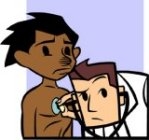
Worksheets and No Prep Teaching Resources
Reading Comprehension Worksheets
Illnesses

Illnesses
 Worksheets and No Prep Teaching Resources Reading Comprehension Worksheets Illnesses |
 Illnesses |
| edHelper's suggested reading level: | grades 4 to 6 | |
| Flesch-Kincaid grade level: | 8.69 |
|
Diabetes
By Jennifer Kenny |

|
 |
Create Weekly Reading Books
Prepare for an entire week at once! |
| Leave your feedback on Diabetes (use this link if you found an error in the story) |
 |
Illnesses
|